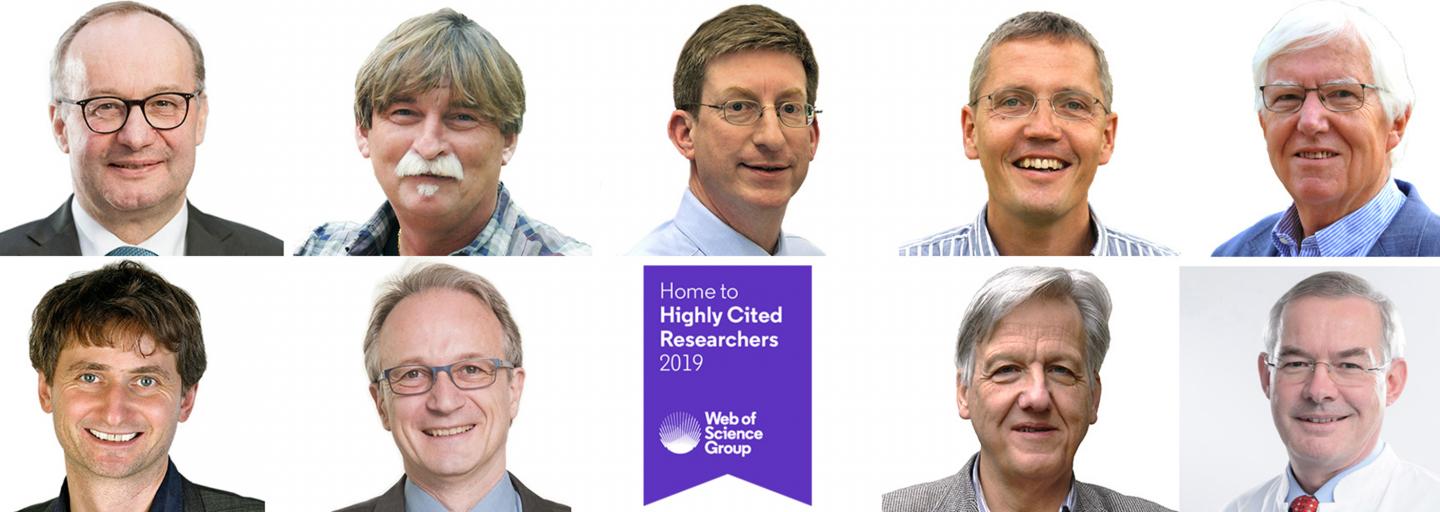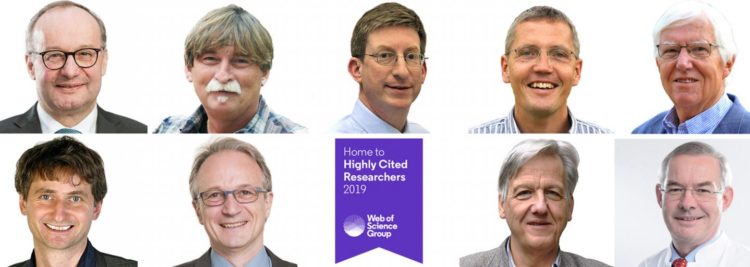
Credit: JMU Wuerzburg
In 2014, Julius-Maximilians-Universität (JMU) Würzburg in Bavaria, Germany, was proud to learn that three of its researchers had earned the distinction of “Highly Cited Researcher”. In 2018, six JMU members were selected for their excellent research performance by citations. And this year, there are as many as eight “Highly Cited Researchers” from Würzburg.
Two medical scientists new on the list
Two JMU professors of medicine have been newly added to the 2019 Highly Cited List: Hans Konrad Müller-Hermelink, the former head of the Chair of Pathology, and Christoph Wanner, a nephrologist.
Medical scientist Hermann Einsele, biophysicist Rainer Hedrich, the pathologist Andreas Rosenwald, animal ecologist Ingolf Steffan-Dewenter, Jörg Vogel, a specialist in RNA research and infection biology, and the chemist Frank Würthner continue to be listed amongst the most influential researchers by citation counts.
The evaluation principle
Highly Cited Researcher – this means that multiple scientific publications of these researchers have been cited extremely often in other articles, books, or other sources.
The current Highly Cited List was established by Clarivate Analytics, a company specialising in citation data, and published on the internet on 19 November 2019. The analysis is based on the “Web of Science Core Collection” database which lists scientific articles from around 21,100 journals. For their 2019 assessment, the analysts looked at the time between 2008 and 2018.
Highly cited papers rank in the top one percent of most-cited publications in their field in the year of publication. Only such scholars who have co-authored multiple highly cited papers may join the ranks of “Highly Cited Researchers” comprising some 6,200 scientists worldwide in 2019.
Physicist among the Citation Laureates
In addition to the list of Highly Cited Researchers, Clarivate Analytics publishes the list of so-called “Citation Laureates” which are considered likely to win the Nobel Prize in their respective field. The Würzburg physicist, Laurens Molenkamp, has been on this list since 2014. To be eligible for the list, a scientist’s published papers must be cited more than 1,000 times. Moreover, their work must concern a trail-blazing discovery or revolutionary progress which the analysts consider worthy of a Nobel Prize.
JMU President congratulates
University President Alfred Forchel congratulates the professors: “I am delighted that the number of Highly Cited Researchers at the University of Würzburg has increased over the past years. This is a remarkable achievement for a university of this size which cannot be taken for granted. So let us all celebrate this huge success!”
Prof. Dr. Hermann Einsele
The head of the Chair of Internal Medicine II and director of the Medical Clinic and Polyclinic II is an expert in haematology, oncology, immunotherapy and infections in patients with a weakened immune system. He developed a cancer therapy based on specifically modified immune cells which he used in clinical practice for the first time in Europe. He was awarded among others the van Bekkum Award in 2003 and has been JMU Vice President since 2015. He is in charge of immunotherapy studies for many tumour diseases. Other focal areas of his work include stem cell transplantation to fight blood cancer and multiple myeloma as well as infectious diseases in immunodeficient patients.
Prof. Dr. Rainer Hedrich
The head of the Chair of Botany I – Molecular Plant Physiology and Biophysics is considered one of the fathers of researching electric signal transmission in plants. He was the first researcher worldwide to determine the functioning of plant ion channels in the laboratory of Nobel Laureate Erwin Neher. Hedrich has received multiple prestigious awards. He studies carnivorous plants within the scope of the “Carnivorom” project funded by the European Research Council. Among others, he discovered that the Venus flytrap counts how often it is touched by its prey and that the number of stimuli determines when the trap snaps shuts.
Prof. Dr. Hans Konrad Müller-Hermelink
Until his retirement in 2009, the professor had headed the Chair of General Pathology and Pathological Anatomy. His focal research areas included the molecular mechanisms of carcinogenesis and the characterisation of cancer-specific alterations in tumour cells. An expert in malignant diseases of the lymphatic system, he has contributed to the reliable diagnosis of these tumours and helped harness findings from research for clinical application to benefit individual cancer patients. He received among others the Rudolf Virchow Medal of the German Society of Pathology.
Prof. Dr. Andreas Rosenwald
The head of the Chair of General Pathology and Pathological Anatomy is an expert in the diagnosis of blood diseases. His research concentrates on the molecular genesis of tumours of the lymphatic system, including diffuse large B cell lymphomas, follicular lymphomas and mantle cell lymphomas. His team was able to contribute to the biological characterisation of molecular subgroups of these tumours for which different treatment options currently exist. Rosenwald is a co-author of the WHO classification of malignant lymphomas.
Prof. Dr. Ingolf Steffan-Dewenter
The head of the Chair of Animal Ecology and Tropical Biology is an animal ecologist, entomologist and beekeeper. He studies the impact of climate change, habitat fragmentation, altered land use and invasive species on insect biodiversity and their meaning for ecosystem functions. His research contributes to understanding the mechanisms that determine the abundance, frequency and interactions between species. He conducted ground-breaking studies of agricultural systems on the pollination of crops, biological pest control and the preservation of biodiversity.
Prof. Dr. Jörg Vogel
The director of the Helmholtz Institute for RNA-based Infection Research (HIRI) and director of the Institute of Molecular Infection Biology at the Medical Faculty of the University of Würzburg studies regulatory RNA molecules in bacterial pathogens such as salmonella. His team develops new methods based on high-throughput sequencing to detect RNA molecules in high resolution and to understand how they work. Winner of the 2017 Leibniz Prize, the biochemist is an elected member of the National Academy of Sciences (Leopoldina) and of the European Molecular Biology Organization EMBO.
Prof. Dr. Christoph Wanner
The head of the Department of Nephrology at the Medical Clinic and Polyclinic I of the Würzburg University Hospital is an expert in kidney diseases that occur in connection with diabetes as well as cardiovascular diseases in dialysis patients and after kidney transplantation. Through worldwide clinical studies, he was able to show for the first time that a drug effective in the kidneys can significantly delay the progression of kidney disease in diabetics leading to renal replacement therapy. The diagnosis, prognosis and therapy of lipid metabolism disorders of patients suffering from kidney diseases are other focal areas of his research. In 2018, he received the Franz Volhard Medal.
Prof. Dr. Frank Würthner
The head of the Chair of Organic Chemistry II and founding director of the JMU Center for Nanosystem Chemistry did fundamental research in supramolecular material chemistry. He developed supramolecular polymers and nano-materials based functional dyes for organic electronics and photovoltaics applications. Following successful research on converting sunlight to electricity, Würthner has also experimented with dye-based materials that use sunlight to produce fuels since 2012. For this purpose, he focuses on biomimetic concepts and synthetic nanosystems. The Society of German Chemists awarded him the Adolf von Baeyer Memorial Medal for his work on dye aggregates.
Prof. Dr. Laurens Molenkamp
The head of the Chair of Experimental Physics III discovered the quantum spin effect in 2007. Moreover, Molenkamp was the first scientist to implement the new material class of topological insulators in experiments. Since his breakthrough, intensive research has been conducted in this domain. Among others, Molenkamp won a EUR 2.5 million ERC Advanced Grant in 2011 and 2017, respectively, and the Leibniz Prize in 2014. In 2017, he received the Stern-Gerlach Medal, the most prestigious award of the German Physical Society.
###
Media Contact
Press Office
[email protected]
Original Source
https:/





